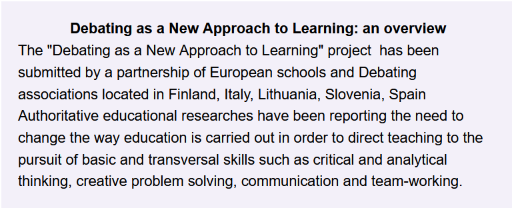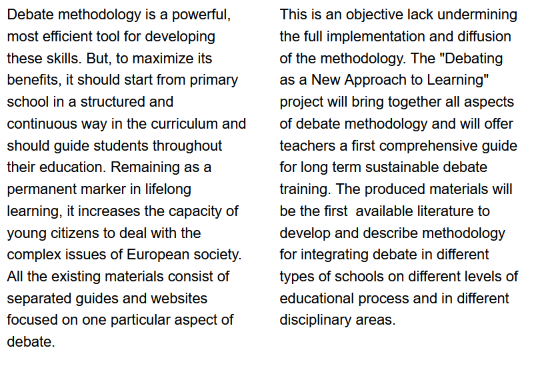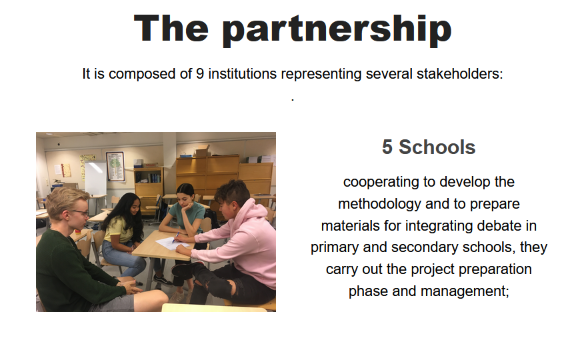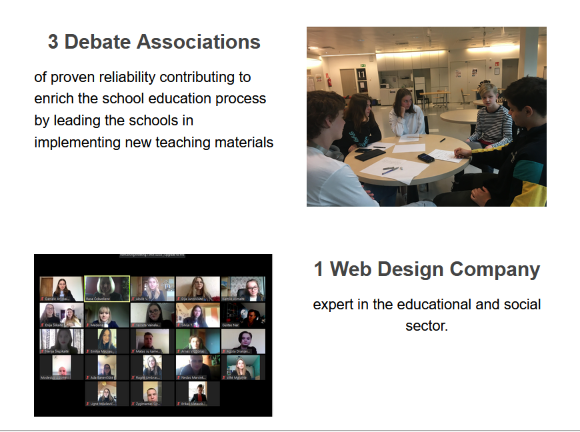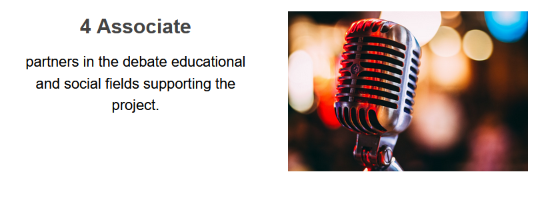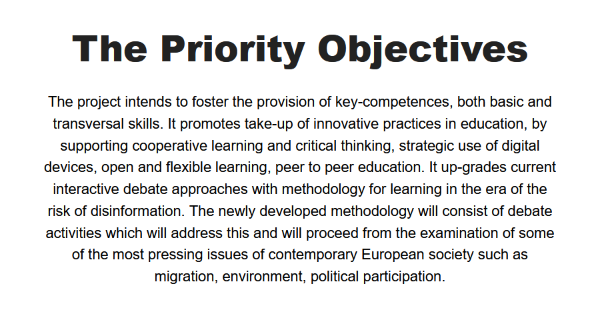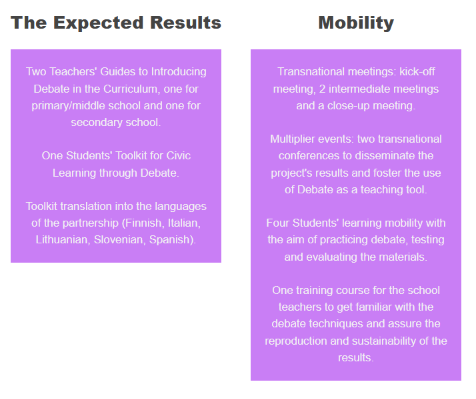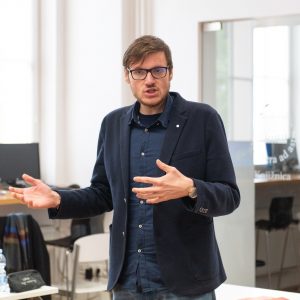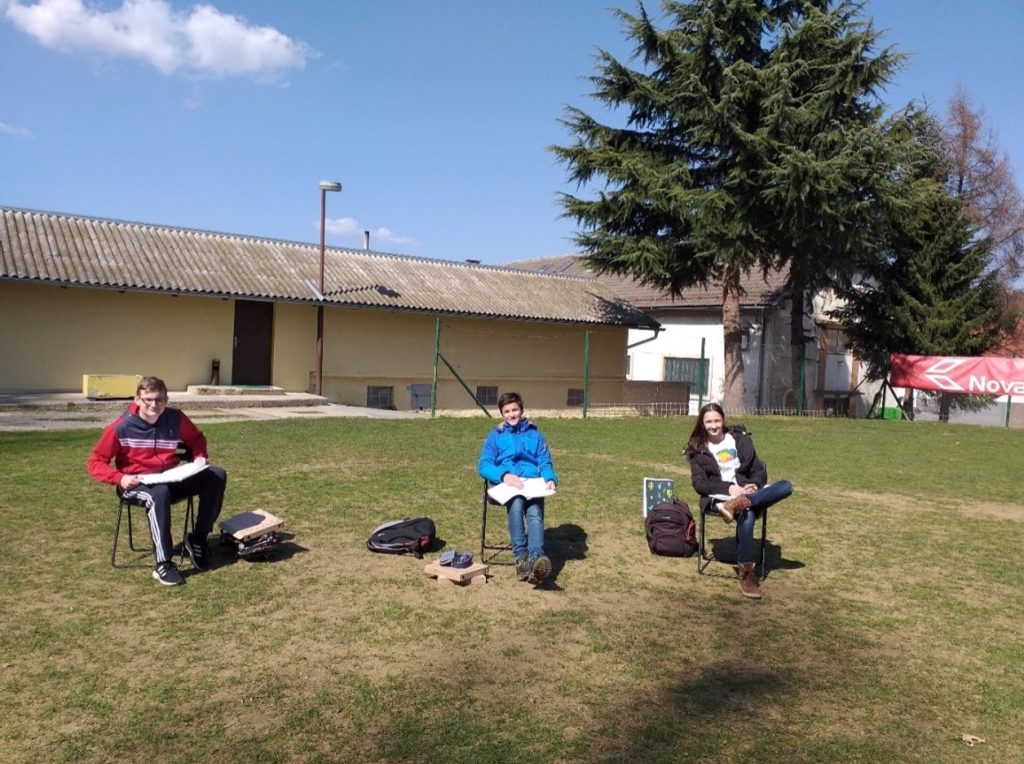Welcome to the first issue of “Debating as a New Approach to Learning” Newsletter. We are pleased to share the first issue of our new biannual newsletter, keeping our partners and stakeholders up to date and involved.
The last few months have not been easy as we’ve strived to continue delivering our work through a pandemic.
We have been forced to live in a socially distanced world, and this has meant huge shifts in the way we work together. Despite this, we’ve all worked tirelessly to continue to keep the school alive and to promote debate.
Relationships with our partners and stakeholders have never been more important. Why listening is vital to reflect on the challenges and pressures we face and the opportunities they present. We are “all in this together”
Giovanna Colombo
Project Coordinator
The Debate guides: interview with Manuele De Conti and Javier Pagan Castaño
 The work of the Writing Team represents the heart of the project, how are you planning the preparation of the two guides?
The work of the Writing Team represents the heart of the project, how are you planning the preparation of the two guides?
Manuele De Conti (SNDI)- Making the guides is a real challenge. As a writing team, we started to examine the existing literature and we considered it necessary to think of guides effectively related to debate as a teaching methodology or didactic method. In fact, even where the Debate is designed for teaching, little is said about how to use it in the classroom. How to adapt formats to students or how to use it to teach subjects’ content are generally neglected. This is the focus of the guides we are developing, without forgetting the framework of competences to which teachers must refer for the promotion and evaluation of students’ progress.
At what point are you with the writing of the indexes and contents?
Manuele De Conti (SNDI) – There is a strong agreement around the index, already written down. And the index, from time to time, works as a compass for us. However, about debate content, the complexity of the framework, focused on a new framework for competence more adapted to highlight debate related dimensions than the key competence framework, is still at the beginning. But things are going on coherently and this is very important.
What is the greatest difficulty encountered in group work?
Javier Pagan Castaño (Fundación Educativa Activa-t) – As it happens in any team, switching on teamwork is not an easy task. It takes time to work at our full potential. As described by Tuckman in his 1965 paper “Developmental Sequence in Small Groups[1]“,
we started our journey clarifying the purpose of our work. Even though we knew what was expected from us, we all have our own views of the project and its outcome.
Our desire and willingness to make progress with the content was continuously held back by an implicit need to understand group dynamics, how each of us will fit in and whether we will be able to work well with each other. The first sessions focused on listening and understanding each other´s vision of the project to build a common ground to start working on the content of the manuals. Role descriptions and responsibilities were an important element to agree on to start our work. As we started familiarizing with each other, roles and responsibilities began to form. It was important to develop a relationship among us to understand what part and role we were going to play in the team.
1]Tuckman, B. W. (1965). Developmental sequence in small groups. Psychological bulletin,63(6), 384.
What is the most challenging aspect in preparing the contents of the guides?
Javier Pagan Castaño (Fundación Educativa Activa-t) – One of the main challenges I am facing when preparing the content for the guides is the continuous “interruptions” in the workflow. Even though a group meeting ends up with clear goals for the next meeting, the illusion that there is a lot of time to do the agreed task until the next meeting, normally two weeks, leads me to put the task aside and focus on other issues not connected with the guides. This “huge distraction” derails my mental progress and affects not only my productivity but also my emotional state, since I feel overloaded when the deadline to present the previous meeting compromises approaches. Procrastination makes me feel guilty for not starting the task before and slows the content creation process.
Pandemic, distance learning and online Debate, what Miha Andric, Za in proti, thinks
According to you, Miha, how did the pandemic affect the debate?
As a debate educator I was glad to see that debate was one of the rare extra and cross curricular activities which did not only “survive” during the pandemic but has also gained many new participants and programs. This was possible since debate truly is a unique approach that enable educators to keep and even increase the interactivity in the online teaching environment and this was truly needed when education has moved online. Second important observation is the accessibility of debate programs during the pandemics – international online debate events (competitions and training) became much more diverse and included many more participants with fewer opportunities, since the financial entry barrier for online events was much lower as there were no costs connected to the travels and accommodation. This has created truly internationally diverse platforms to enhance ideas between young people from different parts of the world but has also crucially affected the fairness and equity in purely competitive events. Teams from poorer economic and geographically peripheral backgrounds did not only get the chance to take part in the events, but have also – with the development of online platforms – gained access to good coaches and teachers which has translated into two important impacts: firstly – now we can observe “new teams” winning the competitions that have previously never been able to compete with programs from central areas equipped with good teaching personnel and secondly – the overall quality of debating is much higher because teams are now able to compete and practice much more with debaters from all around the world. We have also witnessed the rise of new debate programs and events, but here one need to be careful – with so many options possible, the quality control and decisions about which event one should participate in is much harder.
Will the online Debate survive even with the return to face-to-face activities?
There is no question online debate will survive even when most of the education will return to mostly face-to-face activities. There are three
main reasons for that: 1) online debate has simply offered so many benefits and programs will try to further build on these, 2) many new programs and events were established in online environment during the pandemic and consider themselves as “online only” programs and events, and lastly 3) many well-established and old debate programs are trying to be prepared for the possibility of similar critical events in the future, so they will keep the continuity of online activities. After all, many of the debate events have already explicitly announced they are for sure happening online again in 2021/2022 academic year. All this means that the crucial question for debate educators is not whether online debate will survive, but rather how to further develop it and how to make it complementary to the face-to-face activities in the future. At this point the main considerations should include: 1) the question of synchronizing online and face to face activities schedule, 2) possibilities of hybrid events, 3) using online features to further enhance face to face events (especially in terms of accessibility) and 4) quality control of online events and programs
How do you see the future of the debate?
The biggest challenge for debate methodology in future is the question of correct implementation. If debate is not implemented correctly (in terms of proper motions selection for example, quality of feedback for debaters and accessibility of good teaching resources) it might quickly lead to teaching manipulation or promoting arguments based on explicit and implicit bias based on class, gender and race and might therefore lead to radicalization of society rather than to democratization and inclusion. To achieve that four main directions should be considered: 1) development and implementation of accessible teachers’ training to achieve sustainability of programs, 2) development and dissemination of quality self-learning guides for debate teachers and students, 3) adapting debate for the purposes of trans-disciplinary learning in different (not only debate) teaching environments and 4) adapting methodology to new global challenges in terms of new forms of education and crucial topics and skills students should gain. Lissy Clement- We started off the year in August 2020 with high hopes of being able to train and compete normally. A big group of new high school students were totally eager to learn how to debate, and the older ones very willing to teach.
Lissy Clement- We started off the year in August 2020 with high hopes of being able to train and compete normally. A big group of new high school students were totally eager to learn how to debate, and the older ones very willing to teach.
We had our debate course for six weeks until the end of November, and many students wanted to join the debate club after that because they had discovered their talents. Unfortunately lock-down occurred so those dreams were temporarily put aside, by December 1st we were in total lock down until May 1st 2021.
The time to sign up for Nationals came, and fortunately our more experienced debaters joined . Then they said that online debating “wasn’t so bad”. They came in second nationally, which made them hungry for more. In March, we joined the Ljutomer debate which was such a big event with 600 students that our students got so excited about it. They did reasonably well and were eager to continue and we joined the Copenhagen Nordic Schools Debating Championship.
For the last month of school we had club meetings every week coached by our alumni.
We have high expectations for fall 2021!
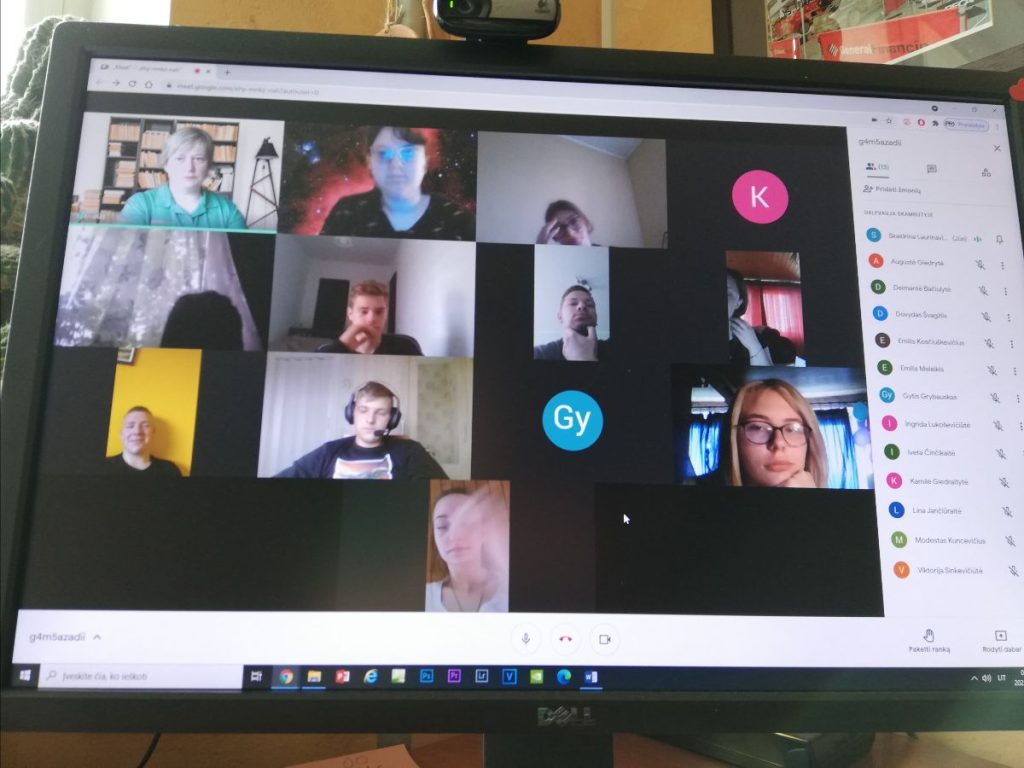
 Elena Tornaghi – At ITE EnricoTosi the debate is included in the school curriculum for all second year classes and the teachers choose in which subjects and paths to conduct debate activities (e.g. Science, Law, History, English)
Elena Tornaghi – At ITE EnricoTosi the debate is included in the school curriculum for all second year classes and the teachers choose in which subjects and paths to conduct debate activities (e.g. Science, Law, History, English)
In addition, various extracurricular activities, in Italian and English, were proposed for students and teachers.
Basic and advanced courses were held every two weeks from January to May on Saturday morning
Students’ opinions: Daniele Testa : ” Hoohoo.. get up and go to school on Saturday! But what a surprise! Thanks to my teachers for the opportunity!”😁😆😇
Ludovico Panariello: “training is important to improve your abilities!”😇
Several teams trained in English participated in three online international tournaments DSDC, IDTL, NSDC and four of our pupils have also been part of the Italian National Team.
David Rizzi: “Cool! I need some practice to get ready to participate in international tournaments!”😁😆
Shannon Sangineto: ” I’ve been both at the Olympics and in several international tournaments. Debating gave me a lot. I’ve learnt to research and debate in international contests. Hope in the future I’ll get more 🥰🤩😍opportunities at the university”
Italian championship: the championship lasted for the entire school year, we registered two teams, one of which ranked fourth at the end of the two qualifying rounds.
Italian Debate Olympics: held from 19 to 24 April 2021 and one of our team participated in the regional selections
Olmo Ceriotti: ” What an experience! Debating all year round!”😜😎
One class also participated in a debate project on business culture at the LIUC University.
Teacher training, several of our teachers have worked as trainers in a series of courses for teachers and a basic training course was guaranteed for the school teachers
Fabiola Viti: “I teach also in other schools but find that Debating is really an empowering competence for students especially to improve their English and capabilities in critical thinking!😁
…And that’s all for this year!
With the help of method “Turn the wheel” students discussed and analyzed the features and diversity of international companies. The debating took place in 2 groups under the topics: the benefits for companies and the negative effects. Students based their opinions on real facts and such competences as communication, cooperation and critical thinking were developed in the lesson.
In the lesson “Basics of citizenship” the 2nd gymnasium form worked on the topic “Immigrants. Emigrants”. In groups students read the annotation for the coming TV show “Immigrants. Emigrants”. The teacher gave each group a part that was at random order: a journalist, emigrants’ children, emigrant parents, grandparents looking after the children, a teacher and a psychologist. Then they were given a task: every group had to prepare for the TV show, they reflected on the situation of the role received, expectations, problems, issues of concern, foresee the questions that could be asked during the show and so on. Then the teacher chose one student from every group to participate in the show, other students became viewers. And so there was a staging of the TV show followed by a discussion. The groups examined the topic by the”Vortex”method as well as these questions:
Group 1 –draw backs of immigration
Group 2 – benefits of immigration
Group 3 – draw backs of emigration
Group 4 – benefits of emigration
Reflection. Issues discussed: What new did I learn about migration? How has my attitude to immigrants changed/ How is my attitude to immigrants changing?
In September and October, I was training two groups of debaters to compete at our national level, at the October debate tournament. I also planned some novices to join the workshops. Unfortunately, the live meeting was canceled just a day before the set date and it all went online. My students were not ready to participate online. We just had great debates at school.
We started remote teaching in the last week of October, so by mid-December we were ready to go online. We took part in our national debate tournament on December 12th with one debate team called Copy-Paste, students aged 14. They were very successful and finished as the third best team.
When we returned back to schools the restrictions were and still are strict and not in favor of our extracurricular activity. The debate club is an extracurricular activity and the rules prohibit joined activities of the students from different »bubbles«, in our case different forms. Therefore, to practice debating was quite a challenge, since the students are of different age groups and grades.
Nonetheless, we managed to participate in another national debate event that took place on March 27th. Two teams from our school were debating: Sončki (»Sunshines«) and X-GAMERS-X, students aged 13-15. They did a good job in the debates. It was again an online tournament.
As we were not allowed to debate in mixed groups inside, we took advantage of the good weather and worked in the playground.
In April, our schools were closed again, due to this reason we did not participate in any other national events.
As a teacher, I use debate as a teaching method. In this year, I also decided to access students of 9 grade English in debating about ecological issues. After good practice, the assessed debate was in my opinion a great success; students expressed some interesting pro and con arguments on the topics as: Climate Changes, Water and Air Pollution, Alternative Sources of Energy, Nuclear Power. I think people in power should hear such debates. The young people did a great research work and learned how to present and defend their standpoint.
In June, we planned to organize some workshops for novice debaters inviting students aged 12 and older, too.
In hope that the next school year surprises us with normal circumstances and new debate opportunities, we are looking forward for the new challenges to come.
We teach theoretical and practical content so that students learn how to find information on a topic, types of speeches, structure of an academic or improvised debate, organize ideas, know how to present them, develop arguments through the ARE rule (affirm, reason and evince), know how to differentiate between fallacy and truthful information, organize a refutation, summarize the main ideas of the debate, be able to ask questions to the other team or ask rhetorical questions, vocalize, work on vocal tonality, mastery of space and body gestures, or lose the fear of speaking in public.
During this school year, due to the limitations included in our AntiCOVID Contingency Plan, it has not been possible to hold face-to-face discussions with other schools like we have done any other year. We have been forced to focus on the Miralmonte School Oratory and Debate Internal Competition, in which the teams of courses from 1st to 4th of Secondary School are participating. This year, the proposed topic has been: “We are prepared to successfully manage a pandemic” and an academic debate format has been followed.Miguel Ángel, 2nd year of Secondary School student. “My role in the debate team is the arguer. In these two years, the debate has helped me in several cases, for example, it helps me to improve my self confidence. In my opinion, the debate is good for lots of situations such as a job interview.”
María del Carmen. “In my opinion, being in the speech and debate club supposes great effort and dedication but the reward is worth it. Living the final debate, in front of judges, colleagues and the public, the work done during the whole year bears fruit and it is worth it. This activity has many advantages, in the future I will not be too ashamed to speak in public, I will know how to express myself and it will be easier for me to express my thoughts to others. I am also learning to work in a team, to coordinate with my colleagues and share information… In my debate team, I am in charge of the conclusion. In this part it is necessary to make a brief summary about what has been happening throughout the debate. This is the role that I like the most since I close the debate.”
[/et_pb_text][/et_pb_column]
[/et_pb_row]
[/et_pb_section]


